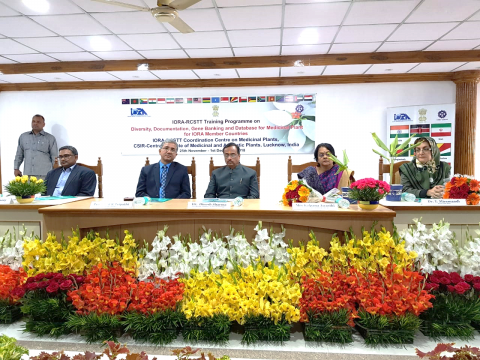
The Training Course has been scheduled by the Council of Scientific and Industrial Research – Central Institute of Medicinal and Aromatic Plants (CSIR-CIMAP) and held in close cooperation with Ministry of External Affairs, India and the IORA RCSTT in Lucknow, India during November 25 to December 01, 2018 as the first activity of the IORA-RCSTT Coordination Centre on Medicinal Plants at CSIR-CIMAP. One of the objectives of the Coordination Centre on Medicinal Plants at CSIR-CIMAP was to address the gaps for improving trade and business of medicinal plants and products among IORA member countries and dialogue partners, the first step is to develop a knowledge repository by creating a robust database on Medicinal plants, Experts, Products, Institutions and Regulatory regimes. This requires collation and compilation of existing domain knowledge on medicinal plants in each member state and its continuous updating. Hence, a programme to sensitize and train the representatives of the Member States was organized by the IORA RCSTT Coordination Centre on Medicinal Plant at CSIR-CIMAP with the following objectives.
1. Assessing and documenting medicinal plant diversity.
2. Conserving the medicinal plant wealth through gene banking.
3. Determining the quality parameters as per the regulatory guidelines.
4. Parameters and information required on medicinal plants for database.
The IORA RCSTT in close cooperation with the Organizing Committee circulated the programme announcements, concept note and other related documents among its Science and Technology Focal points as well as its Medicinal Plants Focal Points of all the IORA Member States and Dialogue Partners to ensure the maximum participation. Fortunately the Training Course was very warmly welcomed by the IORA countries so about 30 applicants from 13 countries including Bangladesh, India, Iran (both public and private sections), Kenya, Malaysia, Mauritius, Mozambique, Oman, Seychelles, South Africa, Sri Lanka, Tanzania and Thailand participated in. The full hospitality extended to all the delegates from IORA countries which covered guest-house accommodation, transportation to and from the airport/hotel/venue and selected meals by the CSIR-CIMAP.
At the end of the training programme, the trainees were more knowledgeable in assessing, documenting and conserving the diversity of medicinal plants of their respective countries to be able to train students in their countries. Further, they were also expected to collect and send the information on medicinal plants, products, institutes, industries and regulatory regime to IORA-RCSTT Coordination Centre on Medicinal Plants for a functional and compact database which can be assessed by all focal points for commercialization among member states in the future.
The member countries agreed to share their knowledge of medicinal and aromatic plants found in their respective countries. They also agreed to submit genetic data of such plants, turning the endeavour into a one of its kind conservation effort by member countries. The genetic data bank will not only help in conservation but also act as a source of information for future generations.
The programme also will help Member States to make trade of these medicinal plants easier. Sharing knowledge and technology involved in harvest of these plants was also a part of the programme. For example, regarding the trade of saffron, Iran is a leading exporter of saffron but the Iranian saffron in the Indian market comes via Europe where it is processed. The training programme and the one in the string will be able to change this story.
